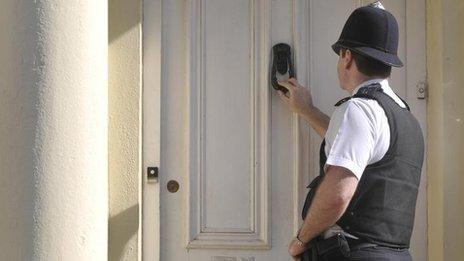Policing cuts 'lead to slower 999 response'
- Published

The Police Federation said 12,000 officers had been cut since 2010
Cuts to police budgets have resulted in slower response times to 999 calls, Labour has claimed.
Research has revealed that some forces have seen response times to overnight emergency calls go up by nearly 30%.
A second study found that abandonment rates - where 999 calls are not answered and forwarded to another line or police force - have also rocketed.
The government said front line policing was being protected and crime had fallen by 10% since 2010.
Service 'hollowed out'
According to Labour Party research, based on Freedom of Information requests answered by 14 police forces, response times for 999 calls between 2300 and 0600 rose from 2011 to 2012.
They included a 29% increase at Durham Constabulary and a 25% rise in Devon and Cornwall.
Shadow Home Secretary Yvette Cooper said: "These new police response time figures show the service provided to the public is being hollowed out by [Home Secretary] Theresa May.
"The police are doing what they can, but the scale and pace of the government's cuts over the last three years is hitting services despite its promises that the front line would not be hit."
A Home Office spokesperson said: "It is for local forces to ensure that they are responding promptly to 999 calls.
"Police reform is working and recorded crime is down by more than ten per cent under this government.
"There is no question the police still have the resources to do their important work.
"What is absolutely clear is that the proportion of police officers in front line roles is increasing."
Durham police and crime commissioner Ron Hogg said he "totally supported" Ms Cooper's concerns.
He said: "The pace and depths of the cuts is entirely unnecessary and is increasingly bringing undue pressure on the front line.
"In Durham Constabulary, we are still maintaining good standards of performance but this becomes increasingly difficult day by day."
Devon and Cornwall Police said: "Our current performance shows 69.5% of all immediate calls created have been attended within the target time of 20 minutes over the last 12 months, against an internal target of 85%.
"However, this contains a number of logs initially graded at a lower priority which have later been upgraded to immediate for an operational reason and hence have failed the target time."
Devon and Cornwall police also fared badly in research by the Bureau of Investigative Journalism, external into 999 call "abandonment rates".
According to its figures, the force's abandonment rate for emergency calls rose to 6.15% in 2012, with police operators failing to answer 12,835 calls.
The abandonment rate for 2010 was 0.5%, with 1054 calls not answered.
The Devon and Cornwall figures were the worst of the six forces which responded to the FOI request.
'Stretched resources'
The force said: "Should a 999 call not be answered within two minutes, it is automatically diverted to a an alternative line and then on to our nominated buddy force, which is currently Dorset.
"Each time the call is re-presented on another line, it is categorised as abandoned - although it is in reality the same call being re-presented and hence the term 'abandoned' gives a misrepresentation of the picture.
"Our current year to date performance for answering 999 calls is 92.48%, with our target being 90%."
Steve Williams, chairman of the Police Federation for England and Wales, which represents rank and file officers, said: "We have lost more than 12,000 police officers since the 2010 general election.
"While our members have risen admirably to the challenge, and will always strive to provide the best possible service, there is a limit to what they can do when resources are being stretched so thinly.
"The depth of the government's policing cuts was always going to impact on service delivery and that has been borne out in these figures."
"Now we are seeing the evidence of increasing delays."
- Published3 February 2011
- Published30 March 2011
- Published30 March 2011
- Published8 February 2012
- Published2 March 2012
- Published16 February 2012
- Published26 January 2012